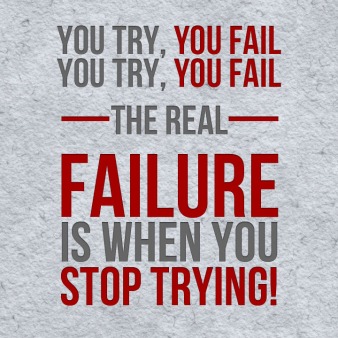Being successful as a Project Manager takes the ability to communicate, make decisions, and multitask among other attributes in varying degrees, but another critical element is the ability to face failure. The stress of failure can be crippling, resulting in dreaded work days and even worse weeks. These uncomfortable experiences are low points in our careers, but they are a necessary evil, providing the opportunity for personal growth. The first mistake I made as an engineer right out of college I will never forget. I dwelled over the issue for days, convinced each day was going to be my last at that company. Lucky enough for me, it turned out to be an easy fix. We forked over a bit in back charges, but in the context of the full project, we still made out ahead. While the issue was remedial, the experience has stuck with me and I can remember that crippling state vividly. Today I believe I stand better for having gone through that. I will never make that same mistake again and as I work with my teammates, I can coach them on how to avoid similar pitfalls.

These mistakes contribute to our confidence moving forward. Experienced struggles fund our own repertoire of abilities as well as provide valuable feedback for our teams. We may not be able to ever remove failures from our jobs, but we can prepare to handle the situations such that our customers, team and ourselves can move past the issues and press on. One of the way I reduce the potential for stress is the way I make decisions. Other times however, the situation may not be a result of anything we personally have done wrong, but rather having to apologize on behalf of someone else. For these occasions and others, there are a few other tricks that can help alleviate anxiety and aid in overcoming the discomfort.
“The worst thing you can do is camp on Bad News”
Walt is an engineer in my office that constantly is preaching that quote, never hang on to bad news. Bottling up and holding out eats you up inside and can lead to a worse situation down the road. Take the example of a supplier, when furnishing equipment, lead times are constantly a point on contention. Customers want material tomorrow and vendors want a month to deliver…leaves everyone in a tight spot. When the news comes through that a deadline is going to be missed, inform your customer right away and allow them time to make arrangements as needed. Remaining silent for days can leave you dreading the conversation for days as well as limit the time for the customer to make changes as needed.
Another tip that I picked up from my boss was to have a game plan before making the phone call. If you are expecting a confrontation, know where you want the conversation to go and identify important points you want to discuss. Entering a verbal boxing ring without gloves is a surefire way to get knocked around. This leads right into my next point which is to have a plan moving forward. Swallowing bad news is hard, but if you offer a solution or progression plan you can show your competence and willingness to assist in a resolution. Not all transactions have to be a win lose, find a middle ground in your game plan that benefits everyone.
Finally, don’t overpromise and under deliver. We are constantly saying this at work because we all have a tendency to take on more work than we can handle and become “yes” people. Can you get that to me by tomorrow?” Sure! Why not? Meanwhile in your mind you know that it will be three days before you even have a chance to look into it. Remember when talking to customers, they generally appreciate honesty and respect your integrity. Telling a customer it will be 4 days to turn something over is a better strategy then under delivering. This strategy will keep you away from the uncomfortable conversations and doesn’t start the relationship off on false pretenses.
I was inspired to write this blog post after reading an article by the Harvard Business Review about communicating failure. The article mentioned a few of these as well as a few other strategies for handling the tough conversations. Everyone reacts differently to stress and confrontation, I would encourage you to practice a few of these strategies and see what works best for you. Regardless of how great you are as a PM or a business person, you will always find yourself having the tough conversation – sometimes it’s due to a decision you made, other times it’s on behalf of someone else. In either situation, it is critical that we remember failures are the best tools for learning and we cannot expect perfection from ourselves or our employees, instead we need to expect simply the desire to do better next time.
I’d love to connect with you on Twitter @Bpetring or LinkedIn and continue these conversations about project management!
2 thoughts on “The Right Way to Fail”